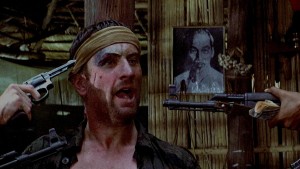I think it’s difficult, if not completely impossible, for someone from my generation or younger to fully grasp the severity and ramifications of the Vietnam War and its horrifying aftermath, in the same token that someone fifty years from now will not be able to fully comprehend what is was like to live through the events of September 11th. Most of us follow suit in the belief that Vietnam was an unnecessary war that cost numerous lives and psychologically disbanded hundreds of thousands of others.
Over the years, countless movies have touched upon the war itself and many have done so to great accolades and success (“Platoon,” “Full Metal Jacket,” “Born on the 4th of July,” and “Jacob’s Ladder” to name a few), and even hit TV shows like “M*A*S*H.” One of the most well renowned and earliest films to tackle the effects of the Vietnam War is the 1978 Academy Award winning “The Deer Hunter.” Winner of four stars and five Academy Awards, “The Deer Hunter” is widely regarded as one of the best movies of all time.
Set out in three distinct acts, the story follows the lives of three Russian-American steelworkers and lifelong best friends; Michael (Robert De Niro) Nick (Christopher Walken), and Steven (John Savage), and their blue-collar lives beginning in the steel mills of a small town outside of Pittsburgh and landing them in the raging horrors of the jungles of Saigon.
Reviewing “The Deer Hunter” on the basis of analytics clearly renders it a solid film. Ripe with symbolism and an abundance of terrific megastar performances, a film like “The Deer Hunter” fits perfectly in the classroom of any collegiate course in cinema. Robert De Niro is one of my all time favorite actors and shows in the role of Michael that he’s brilliant far beyond words and is so much more than a thuggish mobster.

The ambiance of the film is outstanding. From the first scene, you’ll feel as though you are transported back to early 1970s Pittsburgh. From the clothing and the cars to the overall gloomy tone and smoke spewing factories, it screams of its time frame and as a result adds character to the story. Likewise, the Vietnam scenes were filmed on location in Thailand making for a very realistic display.
Immersed in the depths of “The Deer Hunter” is a powerful and well renowned scene involving a sinister game of Russian Roulette. The three primary stars do a masterful job in bringing the tension and downright terror involved in the game, but would you expect less from De Niro or Walken? “The Deer Hunter” also marks the feature debut of Hollywood queen Meryl Streep, whose quite fetching as a 29-year-old rookie, playing Michael’s love interest Linda. Though her time on screen is limited until the third act, Streep demonstrates a charm and candor that mark a perfect foreshadowing to her illustrious career.
One of the more intriguing aspects is of the secondary character of Stan. Actor John Cazale, known for his role as the bumbling Fredo Corleone in “The Godfather,” was diagnosed with terminal cancer after landing the part, and at the time was romantically involved with Streep. When producers of “The Deer Hunter” learned of Cazale’s illness, they wanted to remove him from the film completely but Streep threatened to quit if they did. Always a consummate professional, you can literally see Cazale deteriorating as time in the movie progresses (remember this was 1978, in the days of limited makeup and cover-up effects).
If you are interested in film history, “The Deer Hunter” is something you may want to check out. But from an enjoyment standpoint it’s a tough pill to swallow. In fact, if the same movie were anything other than “The Deer hunter” I would have flipped it off midway through and flunked it outright. But sometimes a film’s reputation can be persuasive, even for me.
– by Matt Christopher
1 Comment
A agree with you 100 percent. A great review.